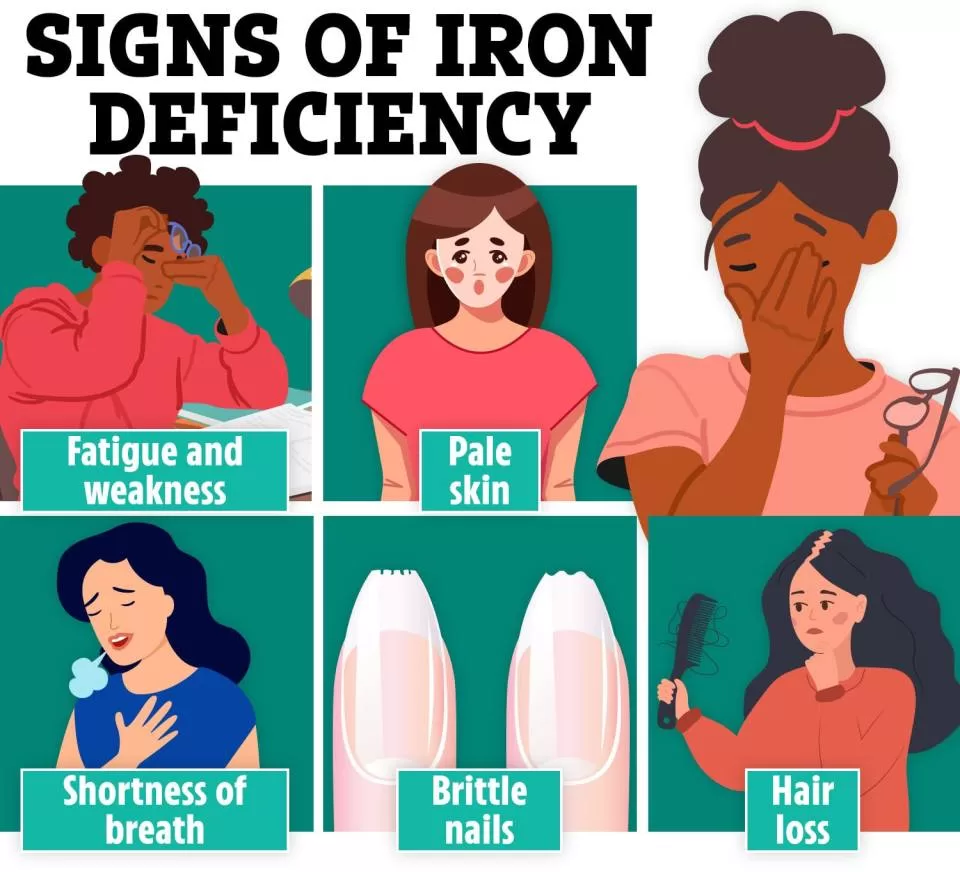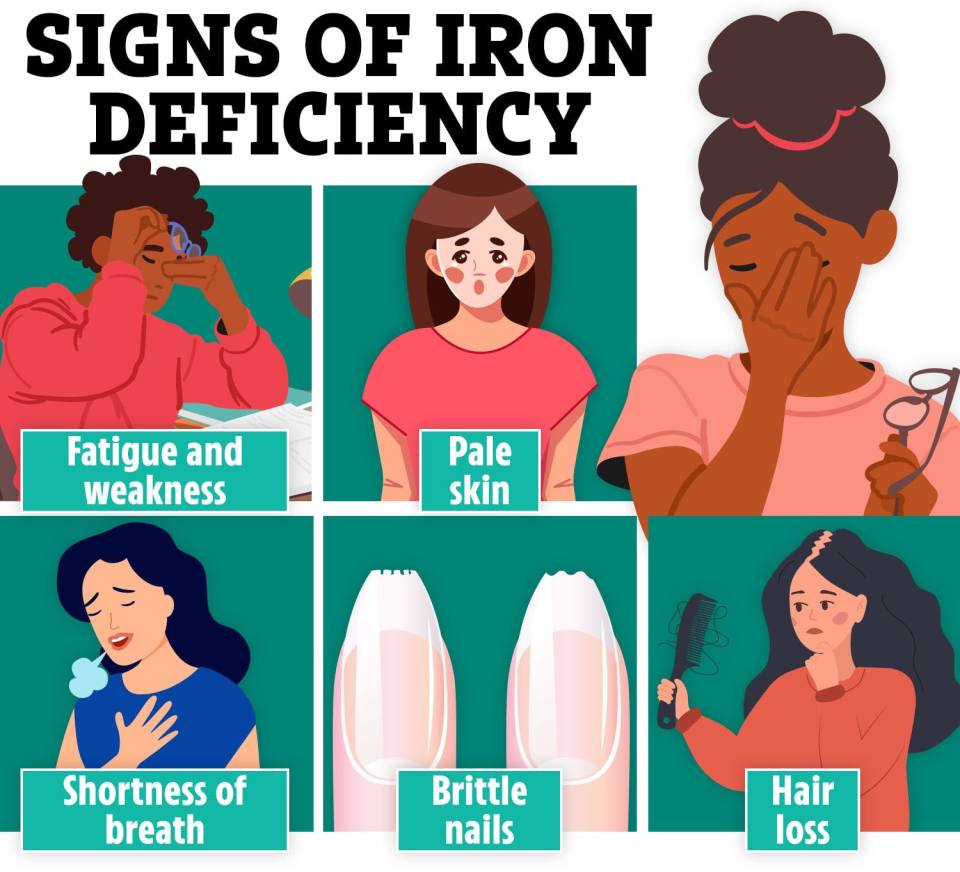DOES your hair seem to have lost its lustre? Are you feeling exhausted and irritable, like you can’t quite shift that persistent brain fog?
Chances are the change in seasons has left you feeling a little low energy or you may be going through the dreaded ‘autumn shed’.
But a combination of subtle symptoms could mean that you’re low in a key nutrient – iron.
Iron is essential to the healthy functioning of your body.
It’s involved in the process of carrying oxygen around the body and can be important for ensuring that your hair, skin and nails are healthy.
Recent US-based studies indicate that nearly one in three Americans have an undiagnosed iron deficiency.
Being low in iron can lead to anaemia, when you have low levels of healthy red blood cells to carry oxygen around your body.
Iron deficiency anaemia can be common during pregnancy, with another recent study finding that four out of five pregnant women in Ireland are iron deficient by their third trimester.
Cara Shaw, nutritionist for liquid iron supplement brand BlueIron, explained why iron is so important to the normal functioning of our body and symptoms that could suggest a deficiency.
She told The Sun: “Iron is vital for haemoglobin production – a protein that helps to transport oxygen around the body – and a is a vital component of energy production.
“Without enough iron, your body cannot supply enough oxygen to the cells nor produce enough energy.”
The nutritionist said this can result in symptoms such as:
- Fatigue and weakness
- Pale skin
- Shortness of breath
- Brittle nails
- Hair loss
Patient.info said your nails may break or split easily if you’re lacking in iron.
Their shape could also change becoming concave, spoon-shaped, or developing ridges.
As for locks, they may lose their lustre before any hair loss occurs.
It revealed a few more telltale symptoms of the condition, some of them a little surprising:
- Tiredness
- Struggling to concentrate
- Memory problems
- Reduced ability to exercise
- Cuts and grazes taking a long time to heal
- A sore tongue
- Sores at the corners of your mouth
- Restless legs syndrome – the intense urge to move or fidget your legs, especially at night
- Pica syndrome – craving or eating substances that aren’t food, such as clay, chalk or coal
It’s recommended you see a GP if you think you have an iron deficiency, as they can perform a blood count test to see if the number of red bloods cells you have in your blood is normal.
Patient.info recommends you get an appointment if you have one or more of the symptoms listed above for more than a few weeks.
There are a number of reasons you may be lacking in iron, from taking drugs like ibuprofen or aspirin to stomach ulcers, inflammation in your bowel and piles, the NHS says.
Heavy periods and pregnancy are very common causes of the condition.
In very rare cases, iron deficiency anaemia can be a symptom of cancer in the bowel or stomach.
Once the cause of your low iron has been pinpointed, there are a number of ways to combat it.
1. Eat more leafy greens and meat
A good way to boost your iron levels is to eat more foods that are rich in iron.
They include:
- Dark-green leafy vegetables like watercress and curly kale
- Cereals and bread with extra iron in them (fortified)
- Meat
- Dried fruit like apricots, prunes and raisins
- Pulses like beans, peas and lentils
If you’re finding it hard to include iron in your diet, your GP may refer you to a specialist dietitian, the NHS notes.
You can also help your body absorb the additional iron in your diet by eating foods high in vitamin C, such as lemons, limes, tomatoes and red peppers, Patient.info says.
2. Drink less tea and coffee
Some foods and drinks may also make it harder for your body to absorb iron, so it could be a good idea to cut down on those.
They include:
- Tea
- Coffee
- Milk and dairy
- Foods with high levels of phytic acid, such as wholegrain cereals, which can stop your body absorbing iron from other foods and tablets
3. Try iron supplements
You can also try topping up your iron through supplements.
Cara told The Sun: “Supplementation is a convenient and effective way to boost levels quickly if someone is suffering from iron deficiency anaemia.
“BlueIron is particularly useful at boosting levels as it is in a liquid form and therefore, more rapidly absorbable by the body as it does not need to break down a solid form like a tablet or capsule.
“The unique formulation ensures that it reaches the intestines for effective absorption – particularly useful if you have digestive conditions that affect the absorption of nutrients.
“It provides your full recommended daily reference intake of iron in just one small 10ml dose, plus is formulated in a way that is very gentle on the gut.”
You can also take your iron in tablet form.
Some people have side-effects when taking iron, such as feeling sick, an upset stomach, constipation, or diarrhoea.
You should tell a doctor if side-effects are a problem.
Risks of iron deficiency anaemia
If left untreated, iron deficiency anaemia can:
- Can make you more at risk of illness and infection – a lack of iron affects the immune system
- May increase your risk of developing complications that affect the heart or lungs – such as an abnormally fast heartbeat or heart failure
- Can cause a greater risk of complications before and after birth if you’re pregnant
Source: NHS

